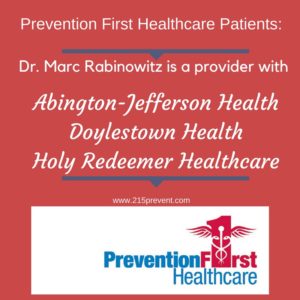Are you over 70 years old and taking aspirin to prevent stroke or heart attack? The latest studies from the New England Journal of Medicine provides new information to discuss with your doctor. There may not be a benefit to taking aspirin as a preventative measure if you are healthy and over 70.
Author: Cheryl Friedenberg
What to do about this year’s flu.
The Flu Season for 2018-2019 has begun. Get your flu shot today and learn about what to do about this year’s flu. Call 215-PREVENT for more information.
Featuring Dr. Marc Rabinowitz of Prevention First Healthcare, Southampton, Bucks County, PA. A concierge medical practice for seniors, busy executives and those who want VIP access to healthcare. This includes same day appointments, specialist appointment scheduling, 24/7 access to your doctor via his cell phone, house calls if needed and more!
#flu #flushot #conciergemedicine #conciergedoctor #buckscountyphysician
Maybe You Should See the Doctor?
Even after a week, that nagging cough won’t go away. “Maybe you should see the doctor,” your spouse suggests. The doctor? For a cough? And some sniffling? And an achy throat?

Three Little Words Can Do More Harm Than Good
There is a certain comfort that comes with the words “I feel fine.” The phrase provides a security blanket that assures us that if we are not feeling certain symptoms, we are “safe” for the time being. And if I am feeling fine, why do I need to see a doctor? I am not looking for trouble.
You don’t wait until your car breaks down before you get the oil changed. Why would you wait for your body to break down before you go to the doctor? By seeing a doctor on an annual basis, you not only add years to your life, but most importantly, you add life to your years.
New Shingles Vaccine
The CDC recommends that healthy adults 50 years and older get two doses of Shingrix, 2 to 6 months apart. Shingrix provides strong protection against shingles and PHN. Shingrix is the preferred vaccine, over Zostavax®, a shingles vaccine in use since 2006.
Prevention First Healthcare is a concierge medical practice in Bucks County, PA providing patients with detailed care, easy access to their doctor and no waiting for an appointment.
New Blood Pressure Recommendations
Dr. Marc Rabinowitz of Prevention First Healthcare discusses the latest Blood Pressure Recommendations. The only way to know if you have high blood pressure is to have your blood pressure tested. Understanding your blood pressure numbers is key to controlling high blood pressure. Consult with your physician.
Preventing Dementia
Dr. Marc Rabinowitz of Prevention First Healthcare, Southampton, Bucks County, PA discusses Dementia. A new study shows women who exercise at a high cardiovascular level will have an 88% less likelihood of developing dementia. Why is that?
February is American Heart Month
February is American Heart Month
Heart Month is an annual observance dedicated to raising awareness about heart health and cardiovascular diseases.
Learn more about heart disease and its risk factors.
Heart Disease in the United States
- Heart disease is the leading cause of death for men, women, and people of most racial and ethnic groups in the United States.1
- One person dies every 33 seconds in the United States from cardiovascular disease.1
- About 695,000 people in the United States died from heart disease in 2021—that’s 1 in every 5 deaths.1,2
- Heart disease cost the United States about $239.9 billion each year from 2018 to 2019.3 This includes the cost of health care services, medicines, and lost productivity due to death. (https://www.cdc.gov/heartdisease/facts.htm)
Are You Heart Smart?
What to Know for a Healthier Heart
Heart disease is the leading cause of death in the United States. One in five deaths is due to heart disease, even though the disease is largely preventable.[1]
Keeping your heart healthy starts with living a heart-healthy lifestyle. But first, you need to get smart about your heart. Knowing what causes heart disease, what puts you at risk for it, and how you can reduce those risks can help you make informed decisions to protect your heart and keep it strong.
Want to test your knowledge? Take this short Heart Smart Quiz:
Heart Smart Quiz
- True or False? High blood pressure is also known as hypertension and occurs when your blood pressure is consistently 130/80 mm Hg or higher.
- True or False? Your body mass index, or BMI, shows if your weight is in a healthy range for your height and is one measure of your future risk for heart disease.
- True or False? Cholesterol helps make hormones, vitamin D, and substances to help you digest foods. Your body needs it for good health, but in the right amounts.
- True or False? Eating lots of vegetables, fruits, and whole grains, using fat-free or low-fat dairy products, and limiting foods high in saturated fat or sugar-sweetened beverages are all part of a heart-healthy diet.
- True or False? Not getting enough sleep or getting poor quality sleep on a regular basis increases the risk of having high blood pressure, heart disease, and other medical conditions.
- True or False? To strengthen their heart, adults should aim to get at least 150 minutes of moderate-intensity aerobic activity such as brisk walking each week.
Answer Key: All answers are True.
How did you do? Knowing your own risk factors for heart disease can help guide your lifestyle choices, so talk to your healthcare provider to make sure you’re clear. Just as important: know your numbers. Your weight, waist size, blood pressure, cholesterol, and blood sugar levels all affect your heart. If they aren’t where they should be, make a pledge to begin improving them.
Adding more physical activity to your day, eating a heart-healthy diet, managing stress, getting enough quality sleep, and not smoking can put you on the path to better heart health.
Learn more about heart disease prevention from The Heart Truth® at www.hearttruth.gov and download the Heart Smart Basics fact sheet to improve your knowledge about heart health.
Abington-Jefferson Health Privileges
Abington-Jefferson Health Privileges
We are pleased to announce:
As of February, 2018, Dr. Marc Rabinowitz is a provider at Abington-Jefferson Health in addition to Doylestown Hospital and Holy Redeemer where he has access to lab and radiology results and will participate in community speaking events.
Dr. Marc Rabinowitz created Prevention First Healthcare in Southampton, PA because he felt that his patients deserved more than a traditional practice could provide; more time with their doctor, more research into their specific medical needs, and more knowledge how to live a happier, healthier life.
